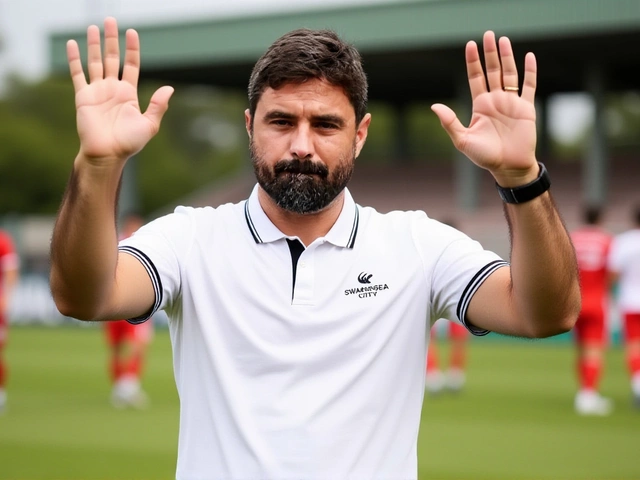Six goals, three braces, one message: Barcelona mean business
Barcelona picked their moment to send a message. A 6-0 win over Valencia, built on a ruthless second half, was their most complete showing of the season and a clean snapshot of life under Hansi Flick. Three different players finished with braces, five goals came after the break, and the unbeaten league run rolled on without a wobble. For a fixture that often tightens up, this one felt decided long before the final whistle. It was the kind of night that makes opponents study tape twice.
How did it unfold? Barcelona controlled the tempo early, stretched the pitch, and wore Valencia down with constant movement. The visitors hung in through the first phase but never disrupted the rhythm for long. Once the dam cracked after halftime, the flood came fast. Barcelona’s wide players kept their full-backs pinned, the midfield stepped higher, and passing lanes opened in the half-spaces. Every attack seemed to end with a clean shot or a scramble in the box. By the time the fifth goal went in, you could feel the energy drop from Valencia’s back line.
Fermín López was central to that change of pace. His timing from midfield kept catching Valencia a step late. One goal came from a late burst into the box, the other from staying alive on the second ball. Nothing flashy; just smart, relentless running and a knack for finding loose space. Under Flick, the young midfielder has grown into a reliable finisher who reads the game at speed. The more Barcelona move the ball quickly into the final third, the more he pops up in scoring positions.
Raphinha played like a man who knew the match-up favored him. He attacked early, took risks, and forced Valencia to defend facing their own goal. Both of his finishes carried the same theme: conviction. When the Brazilian is direct and decisive, Barcelona’s attack gains a vertical edge that’s hard to defend. He didn’t just score; he dragged defenders out of shape and opened passing lanes for teammates chasing the overload.
Robert Lewandowski added the authority you expect from him. He bagged two, including a standout second in the 76th minute, taken first time into the top corner off the underside of the bar. The move came from a quick break, a midfield carry that Valencia never stopped, and a precise through pass that split their line. Lewandowski’s finish was all technique—body shape set early, strike clean, keeper beaten before he moved. It was the kind of goal that turns a big win into a statement.
Valencia never found a foothold. Their first shot on target didn’t arrive until the 71st minute, and that single stat tells the story. The front press lacked coordination, the midfield got stretched, and the back four had to defend too many transitions moving backward. Once they started chasing the ball, pockets of space opened between their lines, and Barcelona piled through. It wasn’t one big tactical flaw; it was death by a thousand small ones—missed triggers, late tracking, and lost duels.
This was also a window into Flick’s broader blueprint. You can see the cues: quick restarts, short passing to draw the press, then a sudden vertical ball to break the line. The wingers hold width, the No. 9 pins the center-backs, and midfielders sprint past the ball at the right moments. That balance—patience until the angle appears, urgency the moment it does—has become a theme. Barcelona don’t just keep the ball; they turn possession into direct pressure. When it clicks, it looks simple. It’s not.
Look at the defensive side too. Barcelona pressed in waves rather than all at once, which meant fewer gaps. When they lost the ball, a body was close enough to slow the first pass out. That half-second delay let the midfield recover shape, especially in the channels where Valencia tried to escape. It’s not glamorous, but it’s the kind of structure that turns one-goal leads into clean sheets—and turns clean sheets into routs.
For context, this fixture has not been kind to Valencia lately, and this one fit the trend. They were second best in speed, duels, and field position. When they tried to sit deep, Barcelona worked the ball side to side until a cross found a runner. When they stepped up, one vertical pass broke their line. The plan never settled, and by the hour mark, the damage was piling up.
- Scoreline: 6-0, with five after halftime.
- Three braces: Raphinha, Fermín López, Robert Lewandowski.
- Valencia’s first shot on target: 71st minute.
- Standout moment: Lewandowski’s second, a 76th-minute strike off the bar.
Individual arcs mattered here. Fermín looks increasingly at home as a third runner, the kind of midfielder who punishes teams that focus only on the front three. Raphinha’s efficiency—pick your moments, attack the space—takes pressure off Lewandowski to drop deep. And Lewandowski himself is reading the box differently, moving the center-backs around to create shooting lanes rather than wrestling for every cross. When those three hum in sync, Barcelona’s attack has height, width, and depth.
The bench also played a role, even if the numbers don’t jump off the page. Fresh legs kept the press sharp and let Barcelona maintain a high tempo late on. Flick used his subs to protect the structure rather than just to rest players. You could see it in how the team defended set pieces and restarted attacks; they didn’t lose their shape once the scoreline grew.
There’s a mental edge too. Staying unbeaten invites pressure—every opponent wants to be the first to crack you—but performances like this ease that weight. The team looked loose, confident, and clear on roles. You could see defenders stepping in with conviction and attackers making runs knowing the pass would come. That kind of trust shortens the game. It takes ideas from the training ground and makes them look natural on match day.
On Valencia’s side, the tape won’t be pretty, but it will be useful. The gaps between midfield and defense were the main leak. When the first man missed in the press, nobody covered the space behind him, and Barcelona’s midfielders went straight through. Fixing that is less about personnel and more about timing—pressing as a unit, with the back line ready to squeeze. Without that, strong sides will keep finding easy entries into the final third.
There’s also the issue of transitions. Valencia didn’t threaten enough when they won the ball. A quick outlet to the wing or a central runner can push a high line back, but those moments were rare. Barcelona’s counter-press deserves credit, but Valencia needed more straight-line speed and cleaner first touches to change the rhythm. Without a counterpunch, the game tilted steadily one way.
What this result says about the title race—and what comes next
Results like this do two things. They add points, and they build belief. Barcelona have not just stayed unbeaten in LaLiga; they’re shaping an identity that travels. The mix of control and directness suits the squad. It lets the veterans lead while younger players add legs and edge. The more repetitions this team gets under Flick, the more automatic it looks.
In the title picture, margins matter. Goal difference can count late in the season, and clean sheets carry weight when schedules get tight. This was a night that padded both. The performance also broadened the list of match-winners. When three different players carry the scoring load, opponents can’t game-plan for one focal point. That variety is a headache for any back four.
Flick won’t dwell on the scoreline. He’ll bottle the balance: the way the team used patience without losing speed, and the way the front line pressed without leaving the midfield exposed. That balance is the real takeaway because it wins away games as much as home ones. It also buys the manager options—rotate without breaking the system, change roles without changing the approach.
For Valencia, the priority is clear: tighten the space between the lines and improve the first pass after regaining the ball. The raw effort was there, but the details weren’t. Against top sides, those small gaps become big chances. This match will become a reference point for what not to repeat.
Strip away the noise, and the headline is simple: Barcelona’s plan is clear, and it’s working. They controlled the middle third, punished the open lanes, and kept the door shut at the back. Nights like this don’t happen by accident. They come from clarity, repetition, and a squad buying into the message.
And for anyone checking the fixture list and wondering where this leaves the season, the answer is straightforward: it raises the bar. Performances of this level don’t just win games; they change expectations. The next time the calendar shows Barcelona vs Valencia, nobody will need reminding what can happen if Barcelona hit their stride.



